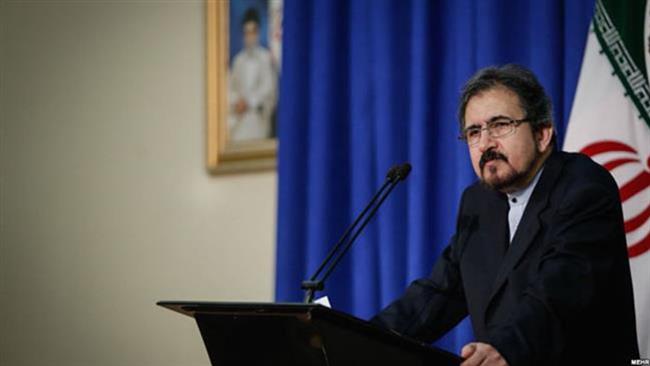Iran fights isolation as Russia and Israel negotiate a deal over southern Syria
LATEST
Iran has denied indirect talks with Israel to avoid a confrontation in southern Syria.
The Saudi-owned Elaph site claimed over the weekend that, via a Jordianian mediator, the Iranian Ambassador to Jordan and senior Israeli officials exchanged messages in an Amman hotel. The Iranians supposedly pledged not to participate in any pro-Assad offensive to seize opposition territory in Quneitra and Dar’a Provinces, near the Jordanian border and the Israeli-occupied Golan Heights. In return, the Israeli military will refrain from intervention if Hezbollah and Iranian-backed foreign militias are not involved in attacks.
See Syria Daily, May 29: Russia Points to Deal with Israel — Only Regime Forces on Border
Syria Daily, May 28: Claim — Israel and Iran in Indirect Talks to Avoid Confrontation in South
Iranian Foreign Ministry Spokesman Bahram Qassemi said on Monday, “This claim is basically wrong and news fabrication.”
Qassemi proclaimed that the false story was circulated to distract the public from Israeli crimes against Palestinians: “The Islamic Republic of Iran certainly does not officially recognize the fake, terrorist and occupying Israeli regime, and the purpose behind such a lie is crystal clear.”
The spokesman made no comment on an apparent agreement between Russia and Israel — backed up by a statement from Russian Foreign Minister Sergei Lavrov on Monday — that Hezbollah, Iranian, and Iranian-supported foreign militias will have no presence in the zone in southern Syria.
Students Challenge Supreme Leader Over Economic and Social Issues
University students have challenged the Supreme Leader over economic issues, in a meeting on Monday.
Local Iranian media reported a discussion in which a student listed problems confronting Iran and directly asked the Supreme Leader how he would respond to them.
Iranian political culture features the raising of concern to Khamenei during audiences he holds during the holy month of Ramadan, but the reporting of the students’ questions takes on significance in light of nationwide protests over political and economic matters in January and of ongoing demonstrations among some industrial workers, farmer, and truck drivers.
Student Sahar Mehrabi read a speech to Khamenei about the “numerous crises” facing Iran, including “intensified systematic inequality in social classes, the decline of public trust, and the increase in the environmental crisis and shantytowns”. She cited high unemployment, the challenges faced by minority groups, and the manner in which hardliners within the judiciary and security system “fabricate security cases in a delusional way” to target activists.
“What answer does Your Excellency have in response to questions, criticisms and protests?” she asked.
Khamenei acknowledged many of the shortcomings, but said “removing problems is not as easy” as students expect. He suggested “injecting of revolutionary, motivated and committed young people into the governmental apparatuses”.
In a vague but significant statement — given battles between the Rouhani Government and hardliners over the blocking, filtering, and censorship of communications and social media — Khamenei said, “Growth of society requires freedom of expression.”
Khamenei’s Twitter account noted the challenge but omitted any specifics and played down any negative aspect:
The sum of this session’s talks shows that, despite their criticism, the University atmosphere is a vibrant, lively one. This session had great tidings, displaying that youth have faith, motivation, and willingness to take action. pic.twitter.com/h7W2Byr2Y5
— Khamenei.ir (@khamenei_ir) May 28, 2018
The Supreme Leader’s website does not mention questions from students and belittles their concerns:
I am informed about the matters of our country and receive reports. I believe we have moved forward in every goal I named. To the young person who says our situation is very bad, I understand their feelings, but not at all their words.
The regime’s English-language site Press TV does not even mention the session.


The lied about no iranian/hezbollah support for the Damascus battles. There were posts of dead hezbollah
Donald Trump ruins an Iranian woman’s business ambitions: http://www.presstv.com/Detail/2018/05/26/562933/US-sanction-Iran-Donald-Trump
Students harshly criticize Iran to supreme leader: https://www.sacbee.com/news/nation-world/article212090764.html
“Iranian university students in a meeting with Supreme Leader Ayatollah Ali Khamenei offered harsh criticism of the country’s direction, local media reported Tuesday, an unusually frank discussion showing the concerns many feel over the Trump administration’s pullout from the nuclear deal with Tehran and Iran’s battered economy.”
Khamenei, for his part, stated that any interaction with American was futile and that Iran has to solve its own problems and not expect outsiders to solve them for it: https://twitter.com/khamenei_ir?ref_src=twsrc%5Egoogle%7Ctwcamp%5Eserp%7Ctwgr%5Eauthor